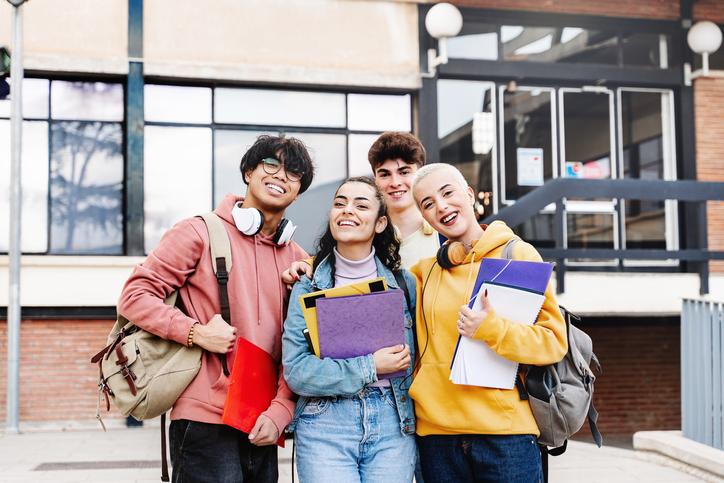Welcoming new students to university isn’t just a formality, it’s a crucial part of their higher education journey. Building their sense of belonging – on campus and online – and helping them connect with each other and their new environment is as important as easing their transition into post-secondary study. In fact, students who are set up for success in both their academic work and their social lives from their very first steps during orientation are not only more likely to stay focused, motivated and happy, they will contribute to a more united university community. In this collection, find out how to welcome students to your classroom and help them build bonds and make friends, and how to cater to international, first-gen and post-Covid cohorts.
Prepare first-year students for success in the classroom from day one
Many experience university as an entirely different beast from school or professional education, with different expectations and teaching methods. These articles share ways institutions can help incoming cohorts settle into academia, including a checklist for the start of term, advice on course inductions and foundation courses, and how to show new students empathy in your teaching.
First-day-of-term tips: a checklist
These steps will help ensure that the first few weeks of term go smoothly for you and your students. Kalpana Gupta of University of Colorado Boulder offers advice.
Welcome! Now what?
A course induction can be more than an information-giving session on the student welcome timetable. It can introduce students to the practice of reflection on short- and long-term goals and what they want to achieve, writes Marianne Savory of Leeds University Business School.
How to be empathetic when teaching first-year students
Creating a supportive and understanding learning environment can build trust, lessen anxiety and improve learning outcomes for students entering university. These practical actions, outlined by Abdulhusein Mizhir Almaamuri of Al-Mustaqbal University, will help educators incorporate empathy into their teaching.
Laying foundations: how to keep first-year students invested in their learning
The challenge for higher education foundation courses is to prepare students for university learning and build their confidence without overwhelming them with information. Singapore Management University's Yeow Leong Lee explains how.
Tips on planning a helpful and welcoming orientation week
Orientation Week, Fresher’s Week, the welcome wagon – whatever you call it, it’s much more than a few events and a new lanyard. Here’s how to combine the necessary admin and information relay into a well-structured, meaningful programme that will get first-year students off to the best possible start.
How student feedback and planning shape a high-impact orientation programme
Orientation Week should not be about institutional formality but about human connection, writes Anusha Nataru of Aditya University. An engaging, effective programme requires careful pacing, warmth and inbuilt capacity to respond to student feedback.
Six ways to welcome students to university life
Find out how to design meaningful welcome experiences for first-year students as they arrive at university and equip them with the tools to start their academic journey. Aikerim Daurenbayeva, Aina Nurtanova and Aruzhan Yergali of Nazarbayev University offer their tips.
The evolution of student onboarding
On-demand, just-in-time digital onboarding can help students filter the vast array of information they receive when they start university, and set them up for success. Cory Elfrink of the University of Canterbury/Te Whare Wananga o Waitaha explains how it works.
Design thinking can transform first-year orientation
Design thinking offers a student-centred approach to orientation. By following these five steps from Jarrell Alder of the University of the West Indies, universities can strengthen first-year experiences and set them up for academic success.
Developing an effective orientation programme for families and friends
Bring families and friends into the onboarding process to ease first-year students into university life, with this guide from Kareina Cadel of Dalhousie University.
‘Every faculty member should go on campus tours’
When Grand Valley State University's Robert Talbert went undercover to find out how different colleges welcomed prospective students and their parents, he found out what institutions should, and should not, do in their visit programming.
Ways to help students build connections and make friends
Students are not at university solely to learn; they are also there to grow into well-rounded adults with the skills to communicate and collaborate. Laying the groundwork for them to build lifelong friendships can be done with activities, social networks and even a Where’s Wally?-themed scavenger hunt, as shown here.
WhatsApp and campus trails: supporting students in building peer-support networks
Group activities and social networks help students feel supported. Here’s how to facilitate interactions that build peer support networks, with advice from Kelly Edmunds, Helen Leggett and Becky Lewis of the University of East Anglia.
Connect new students through the three Ts: teams, talking and Telegram
Find out how to help new students build connections with their peers and communicate with their professors, using these tips from Kenneth Wai-Ting Leung at Hong Kong University of Science and Technology.
Make your Freshers’ Week activities sing
Songwriting sessions, treasure hunts and biscuit decorating are among the creative Freshers’ Week activities that help students build self-confidence, connect with others and ease the transition to university life. Helen Eadon-Sikinson of the University of Chester outlines what’s worked for her.
Where’s Hector? How a scavenger hunt helps first-year students explore the university campus
A collaborative discovery activity has benefits that go beyond simply helping new students get to know the university grounds. It fosters belonging and fun – and even promotes physical well-being, writes Hector Viveros Tapia of Macquarie Business School.
Activities that break down new-arrival nerves
To create the friendly, collaborative learning environment academics strive for, and encourage students to come to in-person classes, these resources on ice-breaking activities show how to turn a group of shy strangers into an open and supportive learning community from the first lesson.
Break the ice early to build student belonging
Ice-breaking activities borrowed from the performing arts can help students form bonds and build belonging from the start of a course. The University of East Anglia’s Kelly Edmunds and Leanne Fridd show how.
Theatre ice-breaker games for team-building in higher education
Using theatre ice-breaker games can break down barriers among students and promote teamwork and trust at the start of a course, write Jóna Guðrún Jónsdóttir and Rannveig Björk Thorkelsdótti of the University of Iceland.
Using VR to break the ice in the classroom
Virtual reality can make introductions more fun and expose students to new technologies. Here, Elvira Luna of Tecnológico de Monterrey offers her tips for introducing it into COIL classes.
Help international students settle in at your university
International students aren’t just starting an educational journey but are often encountering an entirely new culture and, potentially, language, far from their traditional support networks. Tweaking your welcome activities specifically for international students’ needs can show them their new home is excited to have them.
Tips to help international students feel welcome from day one
Loughborough University’s Tim Hewes-Belton offers advice on designing bespoke welcome activities for international students to help them settle into UK university life.
Make your university a home away from home
International students need a strong support system to settle them into their new environment. Find out how to provide one, with these tips from Aray Saniyazova of Nazarbayev University.
How to support overseas students’ smooth transition to a new country
Orientation is an ongoing process for international students, so welcome programmes need to extend further than a single day. Here, Mengping Cheng of the University of Canterbury/Te Whare Wananga o Waitaha explains how to support new arrivals throughout their adjustment.
Four key hurdles international students face – and what to do about them
How can we make international students’ academic journey a positive one? The University of Westminster’s Katherine Mansfield suggests ways to alleviate their social, academic and linguistic challenges.
Support for the post-Covid generation of students
The fresh-faced 18-year-olds walking on to campus for the first time this September will have spent their formative years learning from a screen. Here’s how to ease the lingering lockdown social anxiety, make up for gaps in their learning and help them participate fully in campus life.
How Mozart and the arts can help students feel less awkward
Music and dance give the post-Covid cohort low-stress opportunities to face each other in potentially antagonising – even agonising – set-ups. Here’s how a multisensory curriculum helps students combat feelings of isolation and impostor syndrome, by Brigid Cohen, Wendy Ann Lee, Rosemary Quinn and Mimi Yin of New York University.
Which Covid disruptions specifically affected motivation and engagement?
Lockdowns, isolation and remote learning have all impacted students’ lives. Knowing what and how puts educators in a better position to offer support, writes Andrew J. Martin of UNSW Sydney.
Build community into the curriculum to improve in-person attendance
If the lecture theatre is empty, it’s time to get more innovative in our delivery, says the University of Liverpool’s Gemma Ahearne. Here, she offers approaches that show students the value of attending.
Want students back in the classroom? Don’t give away everything online
Empty classrooms are an unfortunate reality of post-pandemic universities. To stop this, we need to explain the fundamentals of learning and tempt students back, argues Harriet Dunbar-Morris.
Welcoming students from non-traditional backgrounds
First-generation students, and those from deprived areas or with caring responsibilities, might need extra support when starting along the university path. Here’s how to acknowledge their challenges and help them feel not only welcomed but empowered.
How can universities ensure all new students feel welcome?
Nikki Anghileri and Elizabeth Parker of St Mary’s University Twickenham share practical tips on executing an impactful and memorable welcome programme for new students from diverse backgrounds.
Gatekeepers or greeters? We must demystify university for first-gen students
Colorado State University Global’s Stone Meredith gives advice on using positive introductory phrases and how this can help first-generation students navigate university.
How to help first-generation students navigate the challenges of higher education
Strategies such as mentoring programmes and conversations that celebrate their achievements can help first-generation university students to succeed, writes Lyn R. Keith of the University of the West Indies.
How to attract and support non-traditional students in higher education
Hurdles and obstacles are created from the outset, but vice-chancellors often wonder why their student population is not diverse, says Arden University’s Dilshad Sheikh.
Thank you to all who contributed their expertise and insight to this guide.
If you would like advice and insight from academics and university staff delivered direct to your inbox each week, sign up for the Campus newsletter.




comment